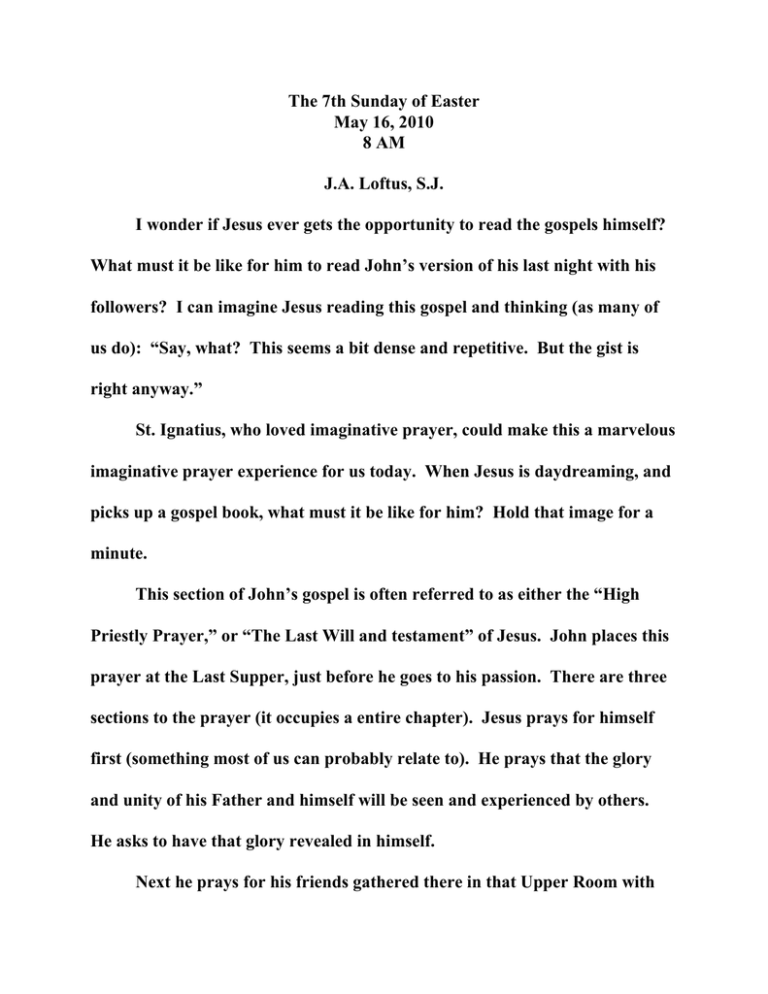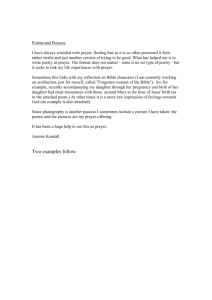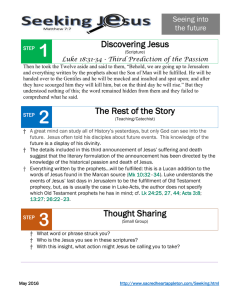The 7th Sunday of Easter May 16, 2010 8 AM
advertisement

The 7th Sunday of Easter May 16, 2010 8 AM J.A. Loftus, S.J. I wonder if Jesus ever gets the opportunity to read the gospels himself? What must it be like for him to read John’s version of his last night with his followers? I can imagine Jesus reading this gospel and thinking (as many of us do): “Say, what? This seems a bit dense and repetitive. But the gist is right anyway.” St. Ignatius, who loved imaginative prayer, could make this a marvelous imaginative prayer experience for us today. When Jesus is daydreaming, and picks up a gospel book, what must it be like for him? Hold that image for a minute. This section of John’s gospel is often referred to as either the “High Priestly Prayer,” or “The Last Will and testament” of Jesus. John places this prayer at the Last Supper, just before he goes to his passion. There are three sections to the prayer (it occupies a entire chapter). Jesus prays for himself first (something most of us can probably relate to). He prays that the glory and unity of his Father and himself will be seen and experienced by others. He asks to have that glory revealed in himself. Next he prays for his friends gathered there in that Upper Room with him. He prays that they can experience the same oneness with Abba that Jesus shares. He wants his friends to touch and smell and see the love that cements not just Jesus and the Father together, but that cements the universe and holds the whole universe in love for eternity. A big and expansive prayer here, very cosmic really. And finally, and perhaps most astounding of all, in today’s section, Jesus launches his prayer into the future. The prayer circle widens to include all “those who will believe in me” through the word of my first friends. Do you know who those people are? They are us! Jesus himself prays for each and every one of us in this church today. That’s Jesus praying for me–and for you. Spend some time thinking about that one if you never have before. Astounding! There is also a very interesting lesson about prayer here for us all. Have you ever felt frustrated and maybe even a little angry at God when your own prayers are not answered? Most can relate, I’m sure. For example, one prays so earnestly for the health of a loved one or friend only to watch the person get progressively worse. Or one asks for beautiful weather for a special picnic, only to get a spectacularly beautiful summer day, and then to find out two children drown in a boating accident at the picnic. Plug in your own 2 experience. Prayer can be frustrating. Be careful what you pray for! The sometimes-depressive playwright, George Bernard Shaw, once quipped: “Life contains but two tragedies. One is not to get your heart’s desire; the other is to get it.” Prayer can be lovely and consoling and powerful. But it can also be experienced as isolating, frustrating, and make one feel ultimately impotent. And Jesus, “like us in all things” the scriptures tell us, seems to know both experiences of prayer as well. Go back to Jesus in your imagination reading John’s gospel with us this morning. He prays that the love he bequeaths to his friends and friends-to-be may be fulsome, obvious, and inviting. He prays that the love and glory he shares with God will transform the world, and bring the unity and harmony that is our birthright to fullness. This is his only heart’s desire, the gospel tells us–his last will and testament. And still with Jesus now, look around. Look at the world he bequeathed to us. The division, the animosity, the fear and bigotry; look at the history of wars and violence; look at nature being daily destroyed. And look at the church he left for us. Fresh horrors on an almost daily basis. And divisions as permanent, it seems, as church history itself. The tragedy of it all. Sin still abounds! 3 And yet he prayed for us! How could God have let him down? Him of all people! You think you and I get frustrated with the outcome of our prayer? Watch Jesus weep for Jerusalem all over again. It’s early in the morning and I do not want to start our day on a depressive note. Really, I don’t. But the scriptures require that we start the day on a realistic note. Perhaps a paraphrase from an older and wiser follower of Jesus can help. Soren Kierkegaard once said: “Prayer does not change God, but it changes the one who prays.” One conclusion is: Prayer, like love, needs to express itself in deeds not just words or pious dreams. The unity and love and glory for which Jesus prays today is now squarely in our hands. Every time we divide or separate ourselves from each other, from our world, within our churches, we frustrate Jesus’ prayer and God’s dream. But only we can stop it. Not even God has that power, it seems. Let’s imagine Jesus again. Let’s imagine him now laughing with delight each and every time he sees you or me making his prayer a reality. Let’s imagine him regularly saying to Abba, his Father: “See! They did get it! Watch them love one another. Watch them holding each other. Watch them feed, and clothe, and visit the least popular among them, the outcasts of society and churches. Watch them learning to accept differences among 4 themselves. Watch them forgive their own idiocy and arrogance. Watch them, Father, spreading the message in their behavior to other, even newer, friends-to-be. Someday, all will be one, as you are in me and I in you.” Someday! Eternity knows no time. Let’s make Jesus’ day! Let’s make his prayer, his last will and testament, a reality. We just need to start! 5








